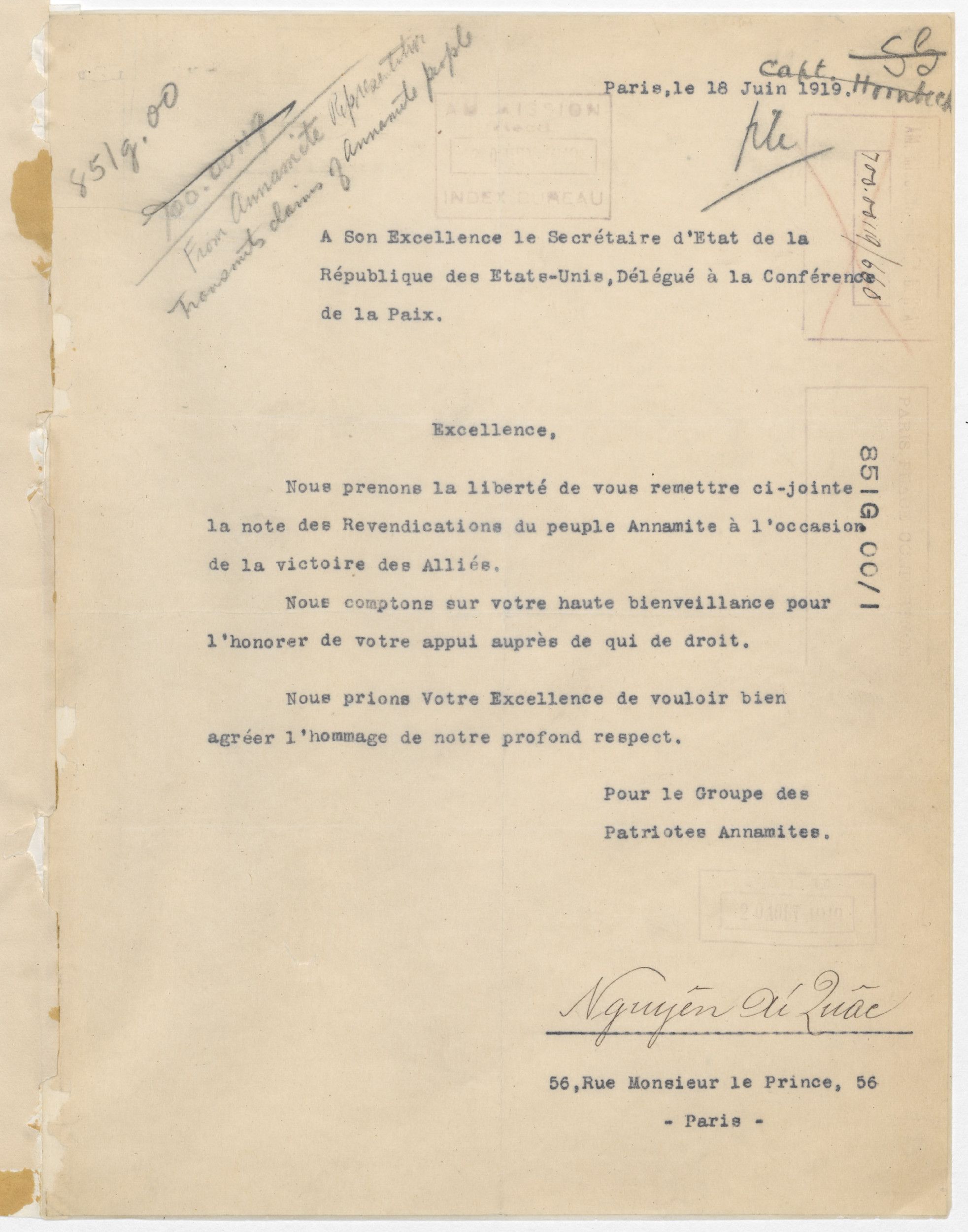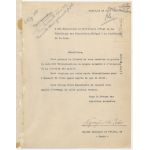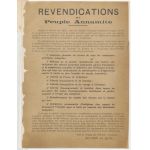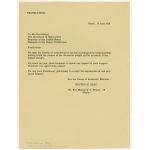Letter from Ho Chi Minh to Secretary of State Robert Lansing
6/18/1919
Add to Favorites:
Add all page(s) of this document to activity:

Add only page 1 to activity:
Add only page 2 to activity:
Add only page 3 to activity:
Add only page 4 to activity:
Ho Chi Minh appealed to the United States to help the Vietnamese win independence from the French several times. His first attempt to win American support was at the Paris Peace Conference at the end of World War I, in which the Allied forces met to set the peace terms for the defeated nations.
Nguyen Ai Quoc (one of Ho Chi Minh’s early aliases) sent this letter as a representative of "le Groupe des Patriotes Annamites" ("the Group of Annamite Patriots") to Secretary of State Robert Lansing. He had reason to be hopeful. President Wilson’s Fourteen Points Declaration (a statement of principles for peace to end World War I) called for self-determination for all peoples. But Wilson’s priority was European self-government. Although Ho Chi Minh received a note saying that the petition would be shared with President Wilson, there was no further response.
The letter contains the enclosure "Revendications du Peuple Annamite" ("Claims of the Annamite People"). It's a call for reform of the French colonial system, directed at French colonial officials. Ho Chi Minh used the term “Annamite” because “Vietnamien” (Vietnamese) with its nationalist overtones, was forbidden by the French. Annam is the name the French gave the central region of French Indochina. The petition was published in L'Humanité, a French socialist newspaper. Copies were distributed on the streets of Paris and found their way to Hanoi.
Nguyen Ai Quoc (one of Ho Chi Minh’s early aliases) sent this letter as a representative of "le Groupe des Patriotes Annamites" ("the Group of Annamite Patriots") to Secretary of State Robert Lansing. He had reason to be hopeful. President Wilson’s Fourteen Points Declaration (a statement of principles for peace to end World War I) called for self-determination for all peoples. But Wilson’s priority was European self-government. Although Ho Chi Minh received a note saying that the petition would be shared with President Wilson, there was no further response.
The letter contains the enclosure "Revendications du Peuple Annamite" ("Claims of the Annamite People"). It's a call for reform of the French colonial system, directed at French colonial officials. Ho Chi Minh used the term “Annamite” because “Vietnamien” (Vietnamese) with its nationalist overtones, was forbidden by the French. Annam is the name the French gave the central region of French Indochina. The petition was published in L'Humanité, a French socialist newspaper. Copies were distributed on the streets of Paris and found their way to Hanoi.
The letter and enclosure are written in French. There is an English translation to the letter, made by the National Archives in 1969.
Transcript
[translation of the letter:]To his Excellency, the Secretary of State of the Republic of the United States, Delegate to the Peace Conference.
Excellency,
We take the liberty of submitting to you the accompanying memorandum setting forth the claims of the Vietnamese people on the occasion of the Allied victory.
We count on your great kindness to honor our appeal by your support whenever the opportunity arises.
We beg your Excellency graciously to accept the expression of our profound respect.
For the group of Vietnamese Patriots
[signed] Nguyen Ai Quoc (Nguyen the Patriot)
56, Rue Monsieur le Prince, 56
-Paris-
[translation of “Demands of the Annamese People”:]
Since the victory of the Allies, all subject peoples are filled with hope at the prospect that an era of right and justice is opening to them by virtue of the formal and solemn engagements, made before the whole world by the various powers of the agreement in the struggle of civilization against barbarism.
While waiting for the principle of national self-determination to pass from ideal to reality through the effective recognition of the sacred right of all peoples to decide their own destiny, the inhabitants of the ancient Empire of Annam, at the present time French Indochina, present to the noble Governments of the entente in general and in particular to the honorable French Government the following humble claims:
(1) General amnesty for all the native people who have been condemned for political activity;
(2) Reform of Indochinese justice by granting to the native population the same judicial guarantees as the Europeans have, and the total suppression of the special courts which are the instruments of terrorization and oppression against the most responsible elements of the Vietnamese people;
(3) Freedom of press and speech;
(4) Freedom of association and assembly;
(5) Freedom to emigrate and to travel abroad;
(6) Freedom of education, and creation in every province of technical and professional schools for the native population;
(7) Replacement of the regime of arbitrary decrees by a regime of law;
(8) A permanent delegation of native people elected to attend the French parliament in order to keep the latter informed of their needs;
The Vietnamese people, in presenting these claims, count on the worldwide justice of all the Powers, and rely in particular on the goodwill of the noble French people who hold our destiny in their hands and who, as France is a republic, have taken us under their protection. In requesting the protection of the French people, the people of Annam, far from feeling humiliated, on the contrary consider themselves honored, because they know that the French people stand for liberty and justice and will never renounce their sublime ideal of universal brotherhood. Consequently, in giving heed to the voice of the oppressed, the French people will be doing their duty to France and to humanity.
For the group of Vietnamese Patriots
Nguyen Ai Quoc
(Ho Chi Minh)
This primary source comes from the Records of the American Commission to Negotiate Peace.
National Archives Identifier: 5049414
Full Citation: Letter from Nguyen ai Quac [Ho Chi Minh] to Secretary of State Robert Lansing (with enclosure); 6/18/1919; 851G.00; General Records , 1918 - 1931; Records of the American Commission to Negotiate Peace, Record Group 256; National Archives at College Park, College Park, MD. [Online Version, https://www.docsteach.org/documents/document/ho-chi-minh-lansing, April 24, 2024]Rights: Public Domain, Free of Known Copyright Restrictions. Learn more on our privacy and legal page.







